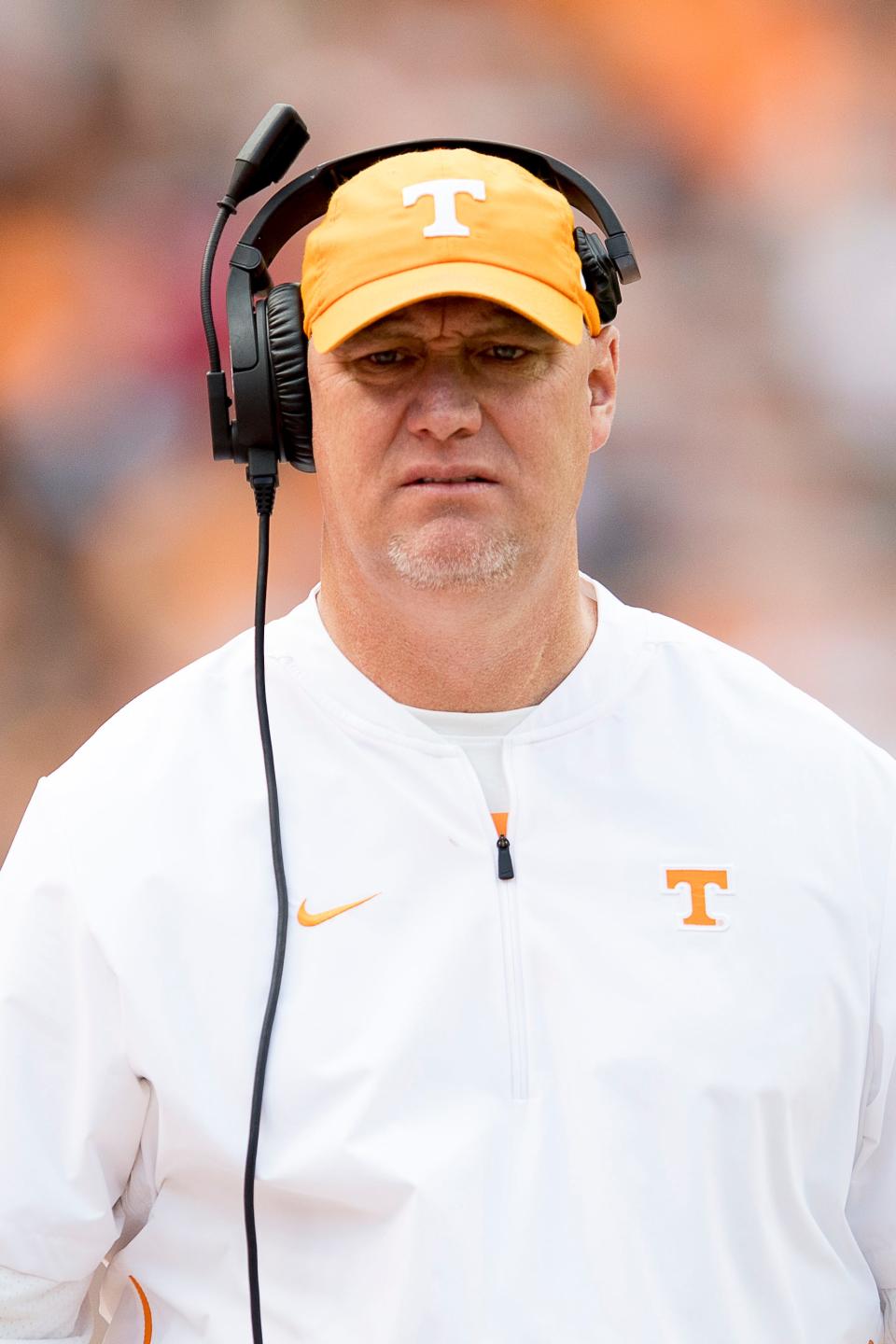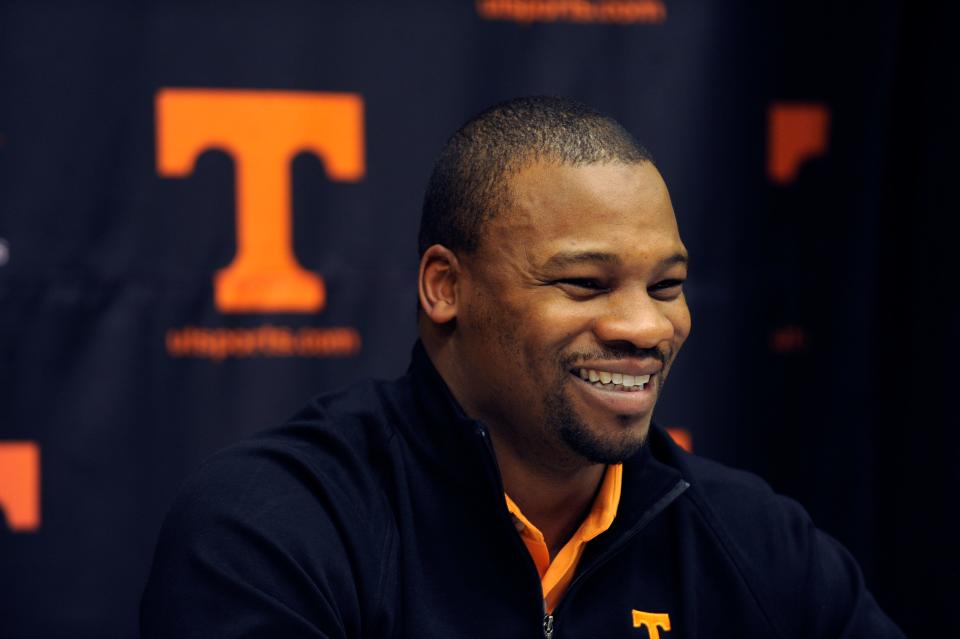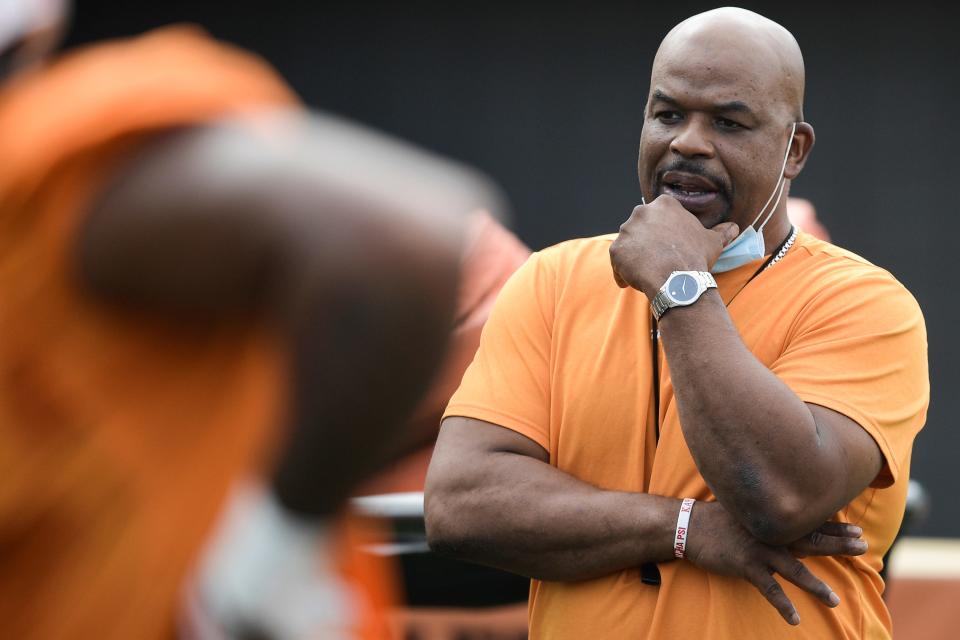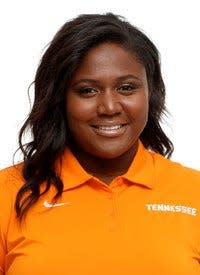How Jeremy Pruitt's Tennessee recruiting scheme unraveled with fake names and loose ends
Fired coach Jeremy Pruitt’s recruiting scheme at Tennessee had grown too much to stay secret by the time a whistleblower reported malfeasance to the chancellor’s office in November 2020.
Too many people knew, and the football program was begging to get caught.
At least 105 people were involved in more than 200 violations committed under Pruitt from 2018 to early 2021, which led to UT football’s five-year probation and show-cause penalties for eight former coaches and staff members, the NCAA reported.
The total includes 29 recruits, 39 family members or friends of recruits, 10 UT players, three players’ family members, nine high school and non-scholastic coaches, three boosters and at least a dozen members of Pruitt’s staff who had “hundreds of opportunities to report actual violations,” the NCAA decision said.
But more than 2,500 pages of documents, including approximately 6,000 text messages, obtained by Knox News via open records requests show the circle was much larger than 105 people – including a "reservation checklist" Pruitt's staff used to rope in Knoxville business managers complicit in violations.
And Pruitt had no way to rein it in.
Additional UT coaches were accused of committing violations out in the open, but they weren’t included in the NCAA decision. Recruits and players said Pruitt’s staff doled out cash in school cafeterias, airports, front yards and a Dollar General parking lot.
Pruitt’s coaches were walking ATMs, and players were finding out.
Dozens more people were involved in violations, many of them with no idea they were facilitating violations of NCAA rules until the probe came to light. That group primarily includes Knoxville hotel and restaurant managers and Neyland Stadium parking attendants.
Once UT started paying restaurant and hotel tabs under the table, recruits invited their girlfriends, friends, teammates and even cousins along for the free trip. The expanded the circle of people who knew, and the challenge for the recruiting staff of keeping their misdeeds quiet.
“This is getting hella ghetto. Only our coaches get people to come visit and we don’t know who all coming,” assistant recruiting director Chantryce Boone said in a text message to another staffer in the final days of the scandal.
It all led to widespread whispers of paying players and recruits, which eventually reached a willing whistleblower.
But that athletic department employee was startled by how many people knew about the infractions yet did nothing, so they reported it to Chancellor Donde Plowman’s office rather than the athletic department.
By then, Pruitt’s recruiting scandal had unraveled. More people around the football program knew about the cheating than those who did not.
And when investigators sought evidence of infractions, there were dozens of businesses involved to provide video surveillance, phone records, bank records and testimony.
Exclusive coverage: Tennessee, Jeremy Pruitt learn NCAA penalties
Why Jeremy Pruitt cited George Floyd, Alabama cash to investigators
Tennessee offered NCAA plea deal in 2021 similar to final verdict
Fulmer was either fooled by Pruitt or feigned ignorance, records show
Tennessee paid Darnell Washington cash. He still went to Georgia
Vols assistant paid recruits from bank account shared with parents
Fulmer's list of candidates to replace Pruitt included some wild names
Derrick Ansley pointed finger at Pruitt in NCAA investigation. Here's how
How Pruitt, staff members cheated NCAA rules— and penalty each received
More Pruitt staffers were involved than you think
There are unwritten rules when it comes to cheating in college football recruiting, and UT appeared to ignore all of them.
For starters, keep the circle tight. The fewer people who know, the better.
Ideally, a recruiting scheme can go undetected if it involves only a head coach, a trusted assistant, a tight-lipped booster and a delivery person to transfer money.
The NCAA said at least a dozen of Pruitt’s coaches and recruiting staff were involved in infractions, but its report did not name them. Eight members got show-cause penalties for the most egregious violations, including a six-year sentence for Pruitt.
It gave multi-year show-cause penalties to Boone; assistant coaches Derrick Ansley, Brian Niedermeyer and Shelton Felton; recruiting director Bethany Gunn; director of player personnel Drew Hughes; and student assistant Michael Magness.
A show-cause penalty means a university cannot hire a coach or recruiter without being subjected to penalties during the length of the ban unless the NCAA signs off.
But records show that additional members of Pruitt’s staff were either involved in violations or knew about them.
UT investigators determined that as many as 25 people on the football staff had a hand in infractions, documents show. The NCAA notice of allegations mentioned 32 coaches and staff members whose involvement ranged from participating in serious violations to having limited knowledge of wrongdoing.
Many of them were low-level staffers carrying out duties at the behest of Pruitt’s coaches. They paid expenses for impermissible recruiting visits and left a trail of text messages and phone records on university-issued phones as evidence.
Players and recruits said Pruitt’s coaches also paid them cash directly. But those allegations were harder to prove because there often were no witnesses and little evidence on school phones.
It’s a common practice for coaches violating NCAA rules to carry burner phones. Investigators mentioned in their reports that they did not have access to coaches’ personal phones.
That’s why some assistant coaches accused of violations avoided major penalties.
Players said cash from coaches was common
Pruitt had 17 assistant coaches in three seasons at UT. Twelve of them appear in either the NCAA notice of allegations or UT investigation because they were alleged to have committed infractions or knew about them.
Some were accused of wrongdoing by players and recruits, but a lack of corroboration kept those allegations out of the NCAA report. Instead, those details are in the independent investigation funded by UT, which Knox News obtained via open records requests.
Multiple recruits and players said that Will Friend, Pruitt’s former UT offensive line coach, gave them small amounts of cash. Friend denied it.
On one occasion, a UT recruit said Friend was visiting his school to recruit one of his teammates in spring 2019. When the recruit saw Friend, he sent him a text message asking for money. He said later, Friend handed him $100 near the cafeteria and admonished him for sending the text.
Friend is now the offensive line coach at Mississippi State.
A UT player told investigators that he knew his teammates were getting paid by coaches, a claim made by other players during the investigation. So in fall 2019, the player asked for money from David Johnson, Pruitt’s running backs coach. The player said Johnson gave him $120 in his office.
Johnson was not interviewed about that allegation, and there were no other witnesses. Johnson is now the running backs coach and recruiting coordinator at Florida State.

A UT player said when the team returned to campus after a COVID shutdown in 2020, he asked defensive line coach Jimmy Brumbaugh to help with his car payment. He said Brumbaugh gave him $250 or $275 in cash in his office.
Brumbaugh denied it. He was fired by Pruitt only four games into the 2020 season, and UT paid him $830,000 in severance. Brumbaugh is now the defensive line coach at Coastal Carolina.
After a home game in 2019, a UT player was asked by coaches to host a recruit. So the player asked inside linebackers coach Kevin Sherrer for spending money.
The player told investigators that Sherrer said, “Don’t worry about it. I’ll be right back.” And when Sherrer returned, he said, “it’s in the side of your bag.” The player said there was approximately $380 in his bag.
There are NCAA protocols for planning recruiting visits. And host players are provided money for restaurants and entertainment for those visits through the compliance office. But coaches aren’t allowed to hand unreported amounts of cash to players for that purpose.
Sherrer declined to be interviewed by investigators. He is now the co-defensive coordinator and inside linebackers coach at Georgia Tech.
Recruit accused Heisman winner, but booster wouldn’t snitch
In December 2018, a booster paid for a recruit’s roundtrip airline ticket from Memphis to Knoxville at the direction of a UT coach.
But the booster, through his attorney, declined to identify the coach to investigators.
The recruit told investigators that quarterbacks coach Chris Weinke offered to arrange the free flight in order to prevent him from visiting another school. And the NCAA cited that accusation in its decision.

But investigators, despite reviewing text and phone records, could not identify with certainty the identity of the coach who told the booster to pay for the flight. Weinke was not interviewed about that allegation.
Weinke was a 1999 national champion and 2000 Heisman Trophy winner as a Florida State quarterback. He is now the quarterbacks coach at Georgia Tech.
The booster, whose name was redacted from all documents, was disassociated by UT indefinitely as a self-imposed penalty.
Tee Martin, Jay Graham weren’t involved like the others
Iconic former UT players Tee Martin and Jay Graham were mentioned only briefly in the investigation.
Graham, an All-SEC running back in the 1990s, was Pruitt’s running backs coach in 2020 and now the coach at Concord Christian School in Knoxville.
Graham, at most, had minor involvement in arranging some impermissible recruiting visits. But he’s not linked to paying players or recruits.
During one visit in May 2020, a voice memo between recruiting staffers claimed that Graham wanted Neyland Stadium “open secretly” for a recruit to tour the facility while the recruit talked to Pruitt on the phone.

Martin, Pruitt’s assistant head coach from 2019-20, was the quarterback of the Vols’ 1998 national title team. Martin was interviewed by investigators on Jan. 22, 2021, four days after Pruitt was fired for cause, and his name appeared in the index of the NCAA notice of allegations.
But Martin, who is now the quarterbacks coach of the Baltimore Ravens, was not implicated in infractions.
Likewise, UT investigators looked into potential involvement in minor violations by former tight ends coach Joe Osovet and co-defensive coordinator/outside linebackers coach Chris Rumph. But they determined no infractions were committed. Osovet is now the coach at Heritage High.
Five other assistants from Pruitt’s tenure were not mentioned in the investigation: Defensive backs coach and former UT cornerback Terry Fair, offensive coordinator Jim Chaney, offensive coordinator Tyson Helton, special teams coordinator/safeties coach Charles Kelly and defensive line coach Tracy Rocker.
Cash wrapped in newspaper in Dollar General parking lot
Gunn, Boone, Hughes and Magness were hit hardest by NCAA penalties among Pruitt’s recruiting staff. They received 22 years combined of show-cause orders.
But other staffers accused of egregious violations dodged serious punishment because of a lack of corroboration. Patrick Abernathy, Pruitt’s director of player development, was at the top of that list.
A recruit’s father told investigators that Abernathy gave him $3,000 cash wrapped in a newspaper to pay for delinquent child support. The father said they met in a Dollar General store parking lot for the exchange.
Abernathy denied paying the recruit’s father when interviewed by investigators. He did not respond to Knox News’ interview request.
Abernathy is the father of UT defensive end Tyler Barron. He coached at Brentwood Academy, Brentwood High and Ezell Harding, and he now serves as defensive coordinator at Bearden.
Did Pruitt staff buy one car or two for recruits?
The same recruit’s family bought a 2013 Dodge Challenger in January 2020, but they told investigators that they didn’t know who paid the $4,000 down payment.
The recruit’s father said Abernathy visited his home and discussed terms on his front lawn.

He told investigators that Abernathy said, “What’d it take? What we gotta do? We need him in Knoxville. We want him Knoxville. … What, what, you need a car?”
And the recruit told investigators that Ansley asked him if he liked “Chargers, Challengers, Dodges” during his visit to UT.
“Considerable effort was made in an attempt to corroborate or disprove” the accusations of the $3,000 cash payment and $4,000 car down payment, according to the investigation funded by UT. But the NCAA did not include either allegation in its case.
Abernathy denied involvement, and Ansley was not interviewed about the car down payment.
Testimony by the car salesman and records from the dealership confirm the $4,000 down payment was provided by someone other than the recruit’s family, but that person was not identified by anyone involved. The recruit's family said that the financing paperwork had already been completed when they arrived at the dealership and the down payment was already listed.
Another complication is that all parties involved changed their story multiple times, and no electronic transfer of the money was found.
But buying a car for a recruit’s family wasn’t unheard of by Pruitt’s staff.
The NCAA charged Pruitt and wife Casey with serious violations for paying a recruit’s mother $6,000 for a down payment on a 2017 Nissan Armada. After the recruit enrolled at UT to play football, the Pruitts paid 25 monthly payments of $500 for the car.
The player’s mother told investigators that she received the money from Casey Pruitt or Pruitt’s babysitter at Pruitt’s home.
Restaurant tabs for recruits got out of control
Infractions were spread across Knoxville and beyond.
Pruitt’s staff ignored a recruiting dead period mandated by the NCAA from March 2020 to June 2021, when coaches weren’t allowed to have in-person contact with recruits.
They quietly hosted recruits and paid the tab for their transportation, meals, entertainment and hotel stays as if they were on official visits in a typical recruiting calendar.
Hotel rooms were paid in cash by a UT staffer before the recruit arrived. Restaurant and entertainment tabs were paid in cash by a staffer after the recruit left the establishment.
Recruits got wise to this arrangement and abused it. Recruiting staff grew frustrated, but there was nothing they could do about it.
One recruit brought 11 people with him to Storming Crab seafood restaurant. Another recruit had a party of seven at Scrambled Jake’s Breakfast Co.
“This stuff is too messy/sketchy/illegal to leave details LIKE WHO IS COMING out,” Boone said to Gunn in a text message. “Like can we be efficient at this if we don’t have a full head count.”
By October 2020, tensions were high among the recruiting staffers who wondered if the cheating was worth the risk and money. It was said plainly in a text message to Boone from an unidentified person, likely a student worker or UT player hosting the recruit since his name was redacted from the report.
“Man these lil mf expensive,” the unidentified person said to Boone, using shorthand for an expletive.
“(I don’t know) why you surprised,” Boone replied.
That weekend, Pruitt’s staff provided $2,424 in impermissible inducements to two recruits, their coaches and family, investigators found.
It repeated all around Knoxville as recruits ate free meals at more than 20 restaurants.
“They been to more restaurants than me and I live here,” Felton said in a text message.
UT paid hotel room for girlfriend and ‘home boy’
Hotel reservations also got out of control.
Players brought their parents, siblings, cousins, high school coaches and teammates, summer league coaches, friends and whoever wanted a free room.
UT paid for room service for a recruit’s girlfriend on one visit, the NCAA reported. And text messages show that recruits often added people to their traveling party with little notice.
During one text exchange, Gunn asked a recruit if she needed to make room for a recruit’s cousin. He replied that he instead needed space for “me and my friend and then home boy.”

When Gunn told the recruit that only rooms with king beds were available, the recruit told her that “home boy” could “sleep on floor.”
Gunn then admitted that she didn’t even know the names of the people who were accompanying the recruit on the visit that violated NCAA rules.
Still, Pruitt’s coaches could’ve covered their tracks better.
During one impermissible visit, they paid for a recruit’s room at the Crowne Plaza. But they wanted to conceal that he was a UT recruit invited secretly by Brian Niedermeyer.
So when the hotel front desk asked who to attach to the room, the UT staffer replied with a fake name: “Patrick Niedermeyer.”
Staff knew which restaurant managers didn’t ask questions
Pruitt’s staff needed help to break the rules, even if those people didn’t know what they were doing was wrong.
Family members and high school coaches of both players and recruits were told passwords to gain free entry into reserved parking lots near Neyland Stadium on gamedays. So parking attendants had to be looped in.
As more people knew, more questions were asked.
Text messages show that a few restaurants refused to allow UT to pay in cash after recruits left the establishment. Sometimes it was because a new manager didn’t know about the arrangement.
In one instance, a server had to be told about UT’s “payment plan,” so they’d know not to bring the bill to the table.
That frustrated the recruiting staffers. So they kept track of managers who didn’t ask probing questions and learned their work schedules on what Boone called a “reservation checklist.”
It was successful for a short time.
After one meal, a recruit’s mother reported back to Boone: “(The restaurant manager) was chill when (she) mentioned payment and lady was well aware and said, ‘like y’all did last time, no problem?’ ”
As a self-imposed penalty, UT sent letters about NCAA rules to Knoxville hotels, restaurants and entertainment venues. They include contact information for the athletics compliance office.
Everybody was in on the joke
The size of Pruitt’s recruiting scandal contributed to his downfall.
Even when the whistleblower’s tip didn’t initially bear fruit, a joke told by a student worker in the UT football program led investigators to a gold mine of information about violations.
He joked that Niedermeyer, the assistant coach, couldn’t take a pay cut during the pandemic because he needed to pay for nail salon visits for recruits and their families.
Everybody was in on the joke because almost everybody knew about the violations.
And there were too many loose ends for Pruitt to tie.
Adam Sparks is the Tennessee football beat reporter. Email adam.sparks@knoxnews.com. Twitter @AdamSparks. Support strong local journalism by subscribing at knoxnews.com/subscribe.
This article originally appeared on Knoxville News Sentinel: Jeremy Pruitt's Tennessee NCAA violations involved more than 105 people

